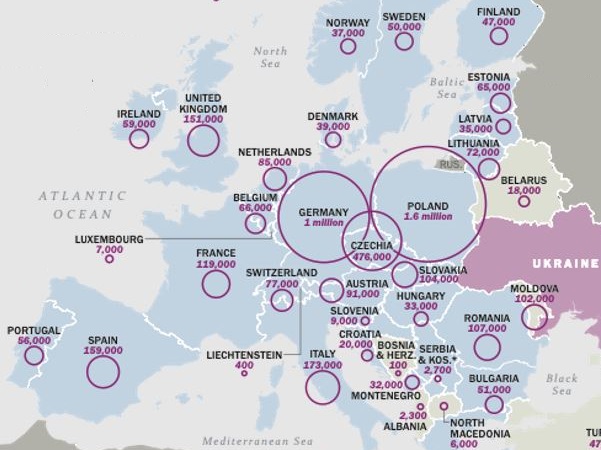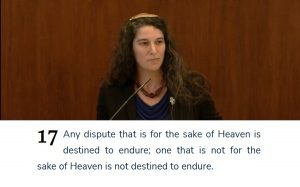US must build on Ukraine refugee response
5 min read
by Marty Wilde
All of us have the right to go to a safe place when conditions in our home country threaten our lives. Born after the genocides of World War II, this right imposes a corresponding duty on the global commons to receive and shelter refugees.
As I wrote a couple of months ago, the Biden Administration expanded private sponsorship for refugees, taking a significant positive step to move past the political impasse over immigration for the most threatened people.
The imposition of new restrictions on seeking asylum at the U.S.-Mexico border signals the need to envision a future where the world stops running from its duty to shelter refugees and takes coordinated action to fulfill it.
The Global Refugee Problem. Approximately 30 million people have fled their home countries, crossing an international border to find safety from persecution. While this number sounds astoundingly large, consider that it represents only 0.4% of the global population and is less than 10% of the US population.
Our proportional share of refugees worldwide is 1.3 million refugees or asylees. Recently, the U.S. has accepted fewer than 200,000 per year—less than 20% of our share. (A refugee applies for entry while still outside the U.S., and an asylee seeks that status after entering the country or arriving at a port of entry.)
The Problem on Our Southern Border. Many people in need of safety would like to relocate to the U.S. However, few of them come from our immediate neighbors. Asylum applications from Mexican nationals historically fall under 700 per year.
In contrast, asylum applications from U.S. nationals for refuge in Canada traditionally exceed those from Canadians seeking asylum in the U.S. Canadians might see a problem at our northern border.
The U.S. is far from alone in accepting far fewer people than its share worldwide. About 36% of refugees worldwide are hosted in just five countries – Turkey, Colombia, Germany, Pakistan, and Uganda. These bear the brunt of refugee pressure because of their proximity to global hot spots.
This “your neighbor, your problem” attitude not only puts people needlessly at risk and overburdens countries that already have their own stability problems, but also creates significant border problems for us, as refugees seeking a safe place to land pass through Mexico (and often many other countries along the way) and claim asylum at our borders.
Obvious tensions exist between the duty to provide refuge and protect refugees from a dangerous pilgrimage, on one hand, and the real and legitimate U.S. concerns about border security, on the other hand. The recent southern border “closure” under Title 42 and the proposal to limit asylum applications at that border skewed that balance against refuge.
There’s nothing inherently wrong with requiring nationals from non-neighboring states to apply online or somewhere other than the border, but the alternative system must have adequate resources to adjudicate these claims. Such a system must also include sufficient cooperation from other countries to safely relocate qualifying applicants after the U.S. has provided refuge or asylum to its reasonable share.
Unfortunately, the asylum system has never adjusted to the increase in applications; a system designed to handle 50,000 applications is overwhelmed by the 200,000 it receives. When the system paroled these applicants within the U.S. while their applications were pending, we could at least say that we were meeting our duty of shelter. With the border closure, we’re now leaving applicants in a situation in Mexico that we know fails to protect them.
If we’re going to require an online application from outside of the U.S., we need both an application that works and sufficient personnel to process the cases it generates. That requires cooperation from a reluctant Congress to fund the asylum system, from adjudication through resettlement.
Failures and Successes of Collective Action. The U.S. can’t go it alone. While current applications for asylum and refuge reach only a fraction of our proportional share, we need a cooperative effort from other countries to ensure a safe and fair distribution. Recent refugee efforts for Syria provide an example of a failed system, while the system for Ukraine has been successful.
The treatment of refugees from Syria has followed the traditional trend of the nearest countries bearing the heaviest burden. With the notable exception of Germany, few countries stood up to provide refuge to Syrians fleeing the war. With no framework for collective action in place, about two-thirds of the refugees ended up in Turkey, a country wracked by its own severe problems, including inflation of 58% in 2022.
Conversely, the international community came together to create a functional system for Ukrainian refugees. Only about one-third ended up in Poland, the country of first refuge for most fleeing the war. The proportional leader in welcoming Ukrainians is Montenegro, a country with no border with Ukraine. While Ukrainians disproportionately remain in Europe, their distribution has been flexible, allowing them to flow where they may seek the best opportunities for their own circumstances.
Progress on protecting refugees requires a positive vision of the future, a vision that inspires us to act to bring it into being. The Ukrainian refugee response shows how collective action can address both the needs of refugees and concerns about border security.
In the U.S., that means first adequately funding the infrastructure necessary to evaluate and support our proportional share of refugees worldwide and then building a network of other countries willing to do the same for those we cannot shelter.
The Biden Administration’s limitation on asylum on the southern border represents an olive branch to congressional conservatives concerned with security. However, unless they agree to adequately support the asylum system with the funds it needs, the consequence will be an abdication of our moral and legal responsibility to those fleeing persecution.
Supporting Refugees
If you’d like to support refugees in our community. I encourage you to check out the Refugee Resettlement Coalition of Lane County.
Contact Marty Wilde by email or see https://martywilde.substack.com/.







